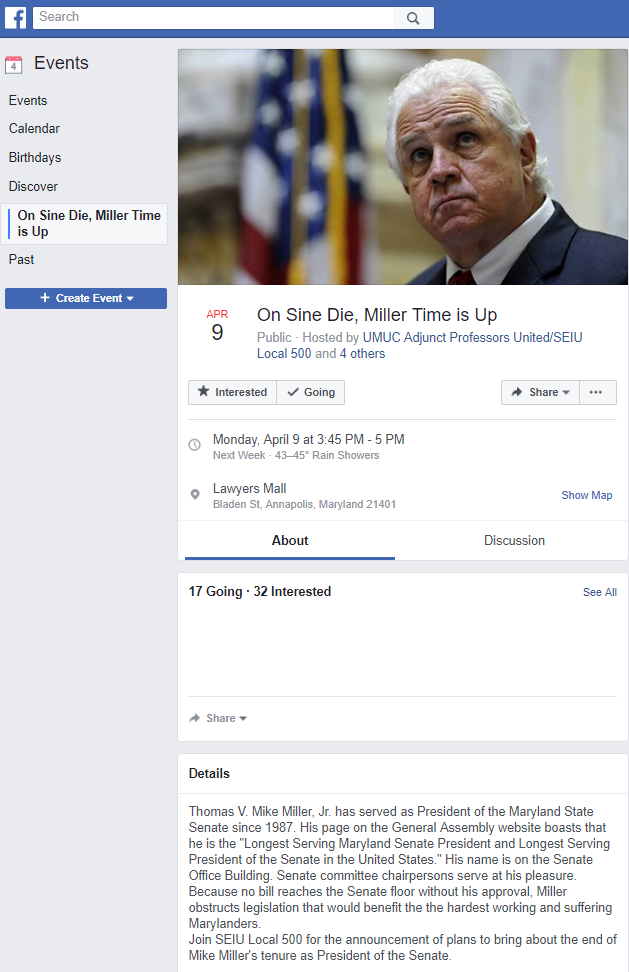By Adam Pagnucco.
The Purple Line is the subject of much drama today, but the truth is that the project has always been wrapped in drama and almost died several times. Indeed, it could have met its end back in 2013. The fact that it survived was a near miracle, and that is in part because of one critical person: retiring Senator Mike Miller. For the first time ever, here is the untold story of how Mike Miller helped save the Purple Line.
As the summer of 2013 approached, the Purple Line was facing a critical deadline: the state had to show the federal government that it could afford its share of the rail line’s cost to be eligible for nearly a billion dollars in federal funding. The problem was that the state didn’t have the money. Depleted by revenue declines during the Great Recession, the state’s transportation trust fund was broke. Without new money, we could never show the federal government that we could meet our part of the cost. Baltimore’s Red Line had the same problem. With no adequate state funding, the feds were bound to send their money to other projects around the country. Both the Purple Line and the Red Line would then die.
A group of advocates then put together a coalition called Get Maryland Moving to lobby for new transportation revenues. Our members included smart growth groups, environmentalists, business organizations and local governments from all over the state. We had a website, social media, press hits, lobbying, day-to-day coordination and all the accoutrements of a mass campaign, all thrown together in a few weeks. We wanted the Purple Line and the Red Line, but we understood that the rest of the state needed their projects too. Our approach was to get enough money for everyone because that was the only way new funding would pass.
Right off the bat, my contacts in the General Assembly told me that a transportation revenue increase was dead on arrival. The legislature had passed a variety of tax increases in the 2007 special session, leading to GOP gains in the House of Delegates in the following election. Nevertheless, the Democrats raised the income tax in 2012. Developer Larry Hogan, who had served in the administration of GOP Governor Bob Ehrlich, had founded Change Maryland largely on the tax issue and was a year and a half away from becoming governor. Democratic state legislators conceded privately that more transportation money was necessary, especially for the Red Line and the Purple Line, but they were extremely reluctant to raise taxes again.
We were underdogs but we had two aces in the hole.
Senate President Mike Miller
Miller seemed like an unlikely ally for MoCo as he had masterminded both an income tax increase and a teacher pension shift the year before, both of which disproportionately crushed the county. But Miller was an absolute warrior on the issue of transportation funding. He knew that the entire state had massive infrastructure needs that had no chance of getting built without more money. Ever since the state’s last gas tax hike in 1992, Miller had never stopped talking about transportation funding. As far back as 1997, Miller told the Baltimore Sun: “The money for these projects doesn’t come out of the sky… It’s going to take a tax increase. It’s a bad word, but it’s got to happen.” In 2008, Miller told me in an interview that he had pushed for a 12-cent gas tax increase, declaring, “We need to move forward as quickly as we can on mass transit.”
Miller never gave up when he cared about an issue, and he cared a lot about transportation funding. He also had no fear of Governor Martin O’Malley, who was reluctant to get out front on a revenue increase that voters opposed. In January, Miller introduced his own revenue bill and put O’Malley on the spot, telling the Washington Post, “This needs to be an initiative by the governor… It doesn’t poll well, but that’s what leadership is all about.”
To hell with the naysayers. We had Mike Miller on our side. That meant we had a shot.
Virginia Governor Bob McDonnell
Former Virginia Governor Bob McDonnell is now known primarily for his gifts scandal in 2014, which led to a conviction that was later overturned by the U.S. Supreme Court. But before that, McDonnell was a rising star in the national GOP who seemed to be going places. As unlikely as it seems now, in the world of 2013, it was not out of the realm of possibility that both McDonnell and O’Malley would someday be on the presidential tickets of their respective political parties.
In his final year in office, McDonnell put together a giant transportation funding bill, showing a level of boldness that contrasted with the reticence of his rival across the Potomac. Annapolis felt the pressure. O’Malley could not be seen as failing on transportation while McDonnell got a new funding package through a state legislature controlled by Republicans. And McDonnell did just that, scoring a huge success in late February as bipartisan majorities passed his multi-billion dollar transportation bill. McDonnell’s success in Virginia along with Miller’s constant urging prompted O’Malley to get off the bench, as he finally sent over an administration bill in early March. The train was starting to move.
But there was one more problem: Baltimore’s lawmakers were resisting the bill. We thought that the prospect of funding the Red Line gave them reason enough to support it. But some city legislators were indifferent to the Red Line, others were outright opposed, and one even told one of our organizers that the state would build it even without new money because “they owe it to us.” The city wanted something different: state school construction money to fix their aging schools. That could have meant the end of transportation funding right there as not everyone was enthralled with the idea of sending more money to Baltimore. And without the city’s votes, our bill would have died.
So state leaders cut a deal with the city: they would get a billion dollars in school construction money, financed with lottery proceeds, in return for voting for the transportation bill. The city got a great deal but the Washington suburbs got the Purple Line. (Hogan canceled the Red Line two years later, causing city leaders to cry injustice on behalf of a project that many of them never truly wanted.) O’Malley’s bill was amended and passed, generating hundreds of millions of dollars for transportation and keeping the Purple Line alive.
Raising transportation revenue required a team effort. Local governments, advocacy groups, the business community and key elected officials all played a part. But Mike Miller was absolutely critical to the effort. He was the first powerful state leader out of the box on the issue. He had talked about the necessity of raising money for transportation projects for years and years while many other politicians cowered under their desks. He wouldn’t let it go and he publicly took on a sitting governor from his own party to get the money. Having Miller in our corner gave us a fighting chance even when it looked like we would lose. When it was time to cut the final deal, we knew that he had both the desire and the capability to work with others and get it done. And he did. To this day, I believe the Purple Line wouldn’t have survived without him.
Here’s an idea. When the Purple Line opens, the state should name its station on the University of Maryland’s College Park campus for Miller. He loves the university, from which he graduated with two degrees, and he has done as much for the state’s infrastructure as any other Marylander. If anyone deserves recognition of this kind, it is surely Mike Miller.









